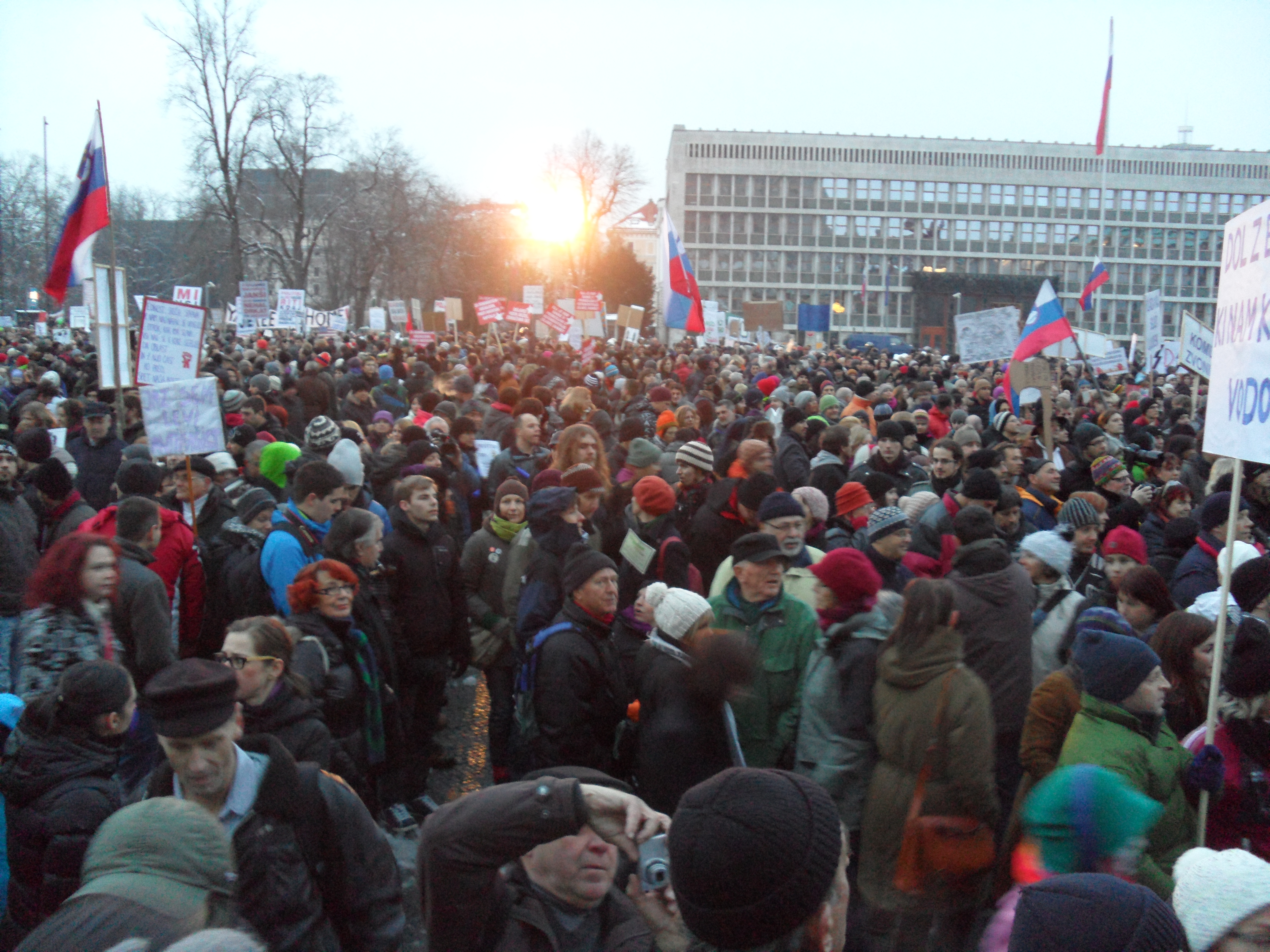2012–2013 Slovenian protests on:
[Wikipedia]
[Google]
[Amazon]
 The 2012–2013 Slovenian protests were a series of anti-establishment and anti-government protests. Protesters expressed disapproval with the country's ruling political elite, including Maribor mayor Franc Kangler, prime minister
The 2012–2013 Slovenian protests were a series of anti-establishment and anti-government protests. Protesters expressed disapproval with the country's ruling political elite, including Maribor mayor Franc Kangler, prime minister
(In Slovene: "Pribac: Pismo SDS predstavlja zadnjih 30 let slovenske zgodovine kot socialistično zaroto zoper Janšo"), Dnevnik, 17 January 2013 Since Janša was ignoring the report and his party didn't offer any replacement for him, all three coalition parties and their leaders left the government within weeks and were subjected to
Interview
with Vesna V. Godina, Večer, 5 December 2012.
 ;Notes
*Note 1: The number of protesters is
;Notes
*Note 1: The number of protesters is
Janez Janša
Ivan Janša (; born 17 September 1958), better known as Janez Janša (), is a Slovenian politician who served three times as a prime minister of Slovenia, a position he had held from 2004 to 2008, from 2012 to 2013, and from 2020 to 2022. Since ...
, and parliamentary opposition leader Zoran Janković (all of whom stood accused of corruption by Commission for the Prevention of Corruption).
Protests began on 2 November 2012 as the 2012–2013 Maribor protests against the city's mayor Franc Kangler and subsequently spread to other cities across the country, with protesters demanding resignations and prosecution of politicians and other members of the elite, accused of corruption.
Background
Government under the right-wing leaderJanez Janša
Ivan Janša (; born 17 September 1958), better known as Janez Janša (), is a Slovenian politician who served three times as a prime minister of Slovenia, a position he had held from 2004 to 2008, from 2012 to 2013, and from 2020 to 2022. Since ...
responded to the weakening of Slovenian economy during the global economic crisis and European sovereign-debt crisis with opening up old ideological fronts against liberal media, and against public sector - especially educational and cultural sectors, accusing them of being under influence of members of old regime (called Udbomafia and "Uncles from Behind the Scenes" (In Slovene: "strici iz ozadja")) and against everyone who doubted that austerity measures forced upon Slovenia are right ones.
In relation to the allegations made by official Commission for the Prevention of Corruption, Janša's party sent letters to the right-wing European Parliament members, discrediting the Commission's report as part of "the communist campaign that begun in 1983 with the aim to remove Janša from politics".Pribac: The SDS Letter Is Interpreting the Recent 30 Years of Slovene History as Socialist Conspiracy Against Janša(In Slovene: "Pribac: Pismo SDS predstavlja zadnjih 30 let slovenske zgodovine kot socialistično zaroto zoper Janšo"), Dnevnik, 17 January 2013 Since Janša was ignoring the report and his party didn't offer any replacement for him, all three coalition parties and their leaders left the government within weeks and were subjected to
ad hominem
, short for , refers to several types of arguments that are usually fallacious. Often currently this term refers to a rhetorical strategy where the speaker attacks the character, motive, or some other attribute of the person making an argument ...
attacks by Janez Janša who accused the SLS's leader Radovan Žerjav of being "the worst (economics) minister in history of Slovenia", while the leader of the Civic List Gregor Virant has been mocked by Janša as engaging in "virantovanje" (a play on words with kurentovanje, a Slovenian carnival festival).
Reception
Reception by public intellectuals
The cause for demonstrations has been attributed by some public intellectuals to misunderstanding of post-socialist political elite who rejected "collectivism as socialist pattern" while, according to notable Slovene anthropologist Vesna V. Godina it is in fact a "pre-socialist pattern", originating from the way the traditional Slovene rural community was functioning much longer than in other – mainly Protestant and to much lesser degree in the mainly Catholic – modern nations, who have replaced traditionalpolitical culture
Political culture describes how culture impacts politics. Every political system is embedded in a particular political culture.
Political culture is what the people, the voters, the electorates believe and do based on their understanding of the ...
earlier in history by the modern representative democracy and individualism.with Vesna V. Godina, Večer, 5 December 2012.
Timeline
approximate
An approximation is anything that is intentionally similar but not exactly equal to something else.
Etymology and usage
The word ''approximation'' is derived from Latin ''approximatus'', from ''proximus'' meaning ''very near'' and the prefix ...
, given by the media.
*Note 2: The list includes only those who sought and received medical treatment.
See also
* Trans-Universal Zombie Church of the Blissful Ringing * List of protests in the 21st centuryReferences
{{DEFAULTSORT:Slovenian protests, 2012-2013 2012 protests 2013 protests 2012 in Slovenia 2013 in Slovenia Slovenian Protests in Slovenia